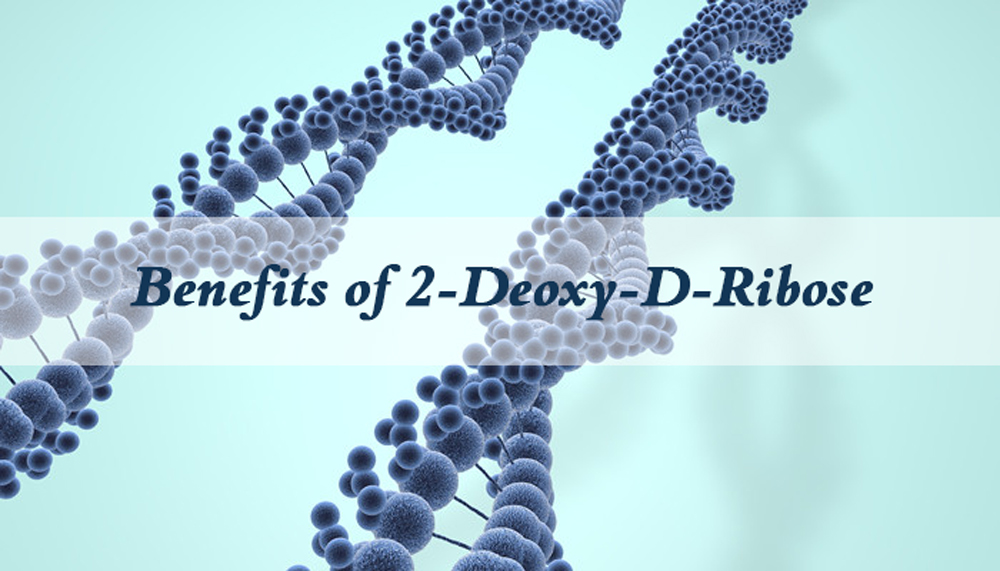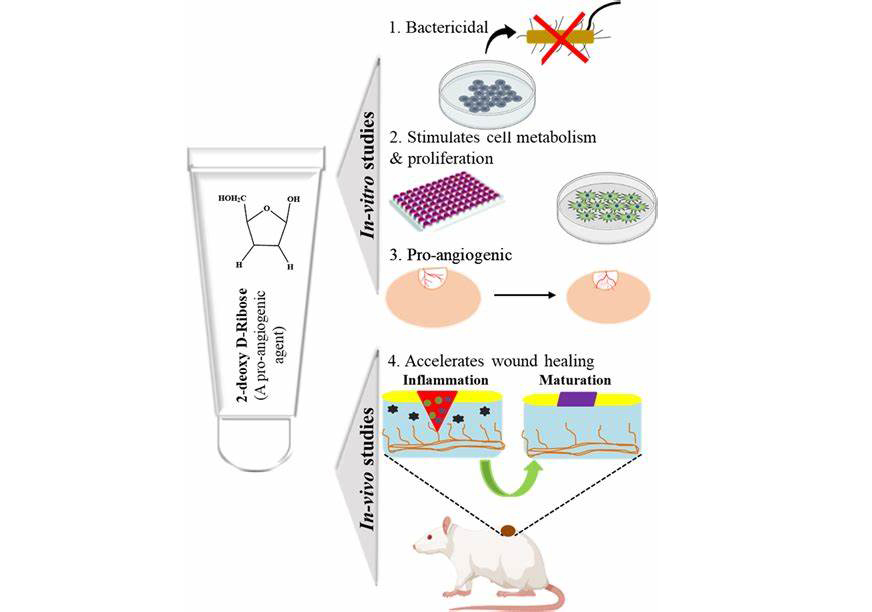2-Deoxy-D-Ribose is a naturally occurring sugar that plays a key role in the biosynthesis of nucleotides, which are essential components of DNA and RNA. It is a structural component of DNA, unlike ribose, which is a part of RNA. Some potential benefits of 2-Deoxy-D-Ribose are:
- Cancer Treatment Potential: 2-Deoxy-D-Ribose has shown promise in cancer therapy due to its ability to inhibit glycolysis, the process by which cancer cells generate energy. Many cancer cells rely heavily on glycolysis (known as the Warburg effect) for energy production, even in the presence of oxygen. By interfering with this process, 2-Deoxy-D-Ribose can potentially slow the growth of cancer cells.
- Energy Metabolism: 2-Deoxy-D-Ribose is involved in the metabolism of nucleic acids and has been suggested to improve energy metabolism in certain cells. It is structurally similar to glucose, and by inhibiting certain pathways in energy production, it can influence cellular energy dynamics.
- Potential in COVID-19 Treatment: During the COVID-19 pandemic, 2-Deoxy-D-Ribose was explored as a potential therapeutic agent for COVID-19 patients. It was suggested that 2-Deoxy-D-Ribose might interfere with the virus’s replication process, as viruses depend on glucose metabolism for their replication, and blocking glycolysis may help limit viral proliferation.
- Antioxidant Effects: Some studies suggest that 2-Deoxy-D-Ribose may have antioxidant properties, which could protect cells from oxidative stress. This might be beneficial for conditions where oxidative stress plays a role, such as neurodegenerative diseases or inflammation.
- Potential in Neurodegenerative Diseases: Some research has also explored 2-Deoxy-D-Ribose’s effects on neurodegenerative diseases like Alzheimer’s or Parkinson’s, as it might help reduce the energy deficit seen in neurons in these conditions.
- Improvement in Muscle Function and Physical Endurance: 2-Deoxy-D-Ribose is sometimes used in fitness and performance settings for its potential to influence muscle function and endurance by enhancing metabolic pathways, although more research is needed in this area.

It’s important to note that while 2-Deoxy-D-Ribose has shown potential in various studies, its use as a medical treatment is still being researched, and it is not yet widely approved for clinical use in many areas. Always consult a healthcare provider before considering any supplement or therapeutic approach.
Uses of 2-Deoxy-D-Ribose
2-Deoxy-D-Ribose is a monosaccharide, a type of sugar, that plays an essential role in biochemistry. It is a modified form of ribose, where the hydroxyl group (-OH) on the 2′ carbon atom is replaced by a hydrogen atom (hence the name “deoxy”). It has various applications in both scientific research and medicine:
1. Nucleic Acid Synthesis:
DNA Synthesis: 2-Deoxy-D-Ribose is a key building block of DNA (Deoxyribonucleic Acid). It forms part of the sugar-phosphate backbone of DNA molecules. The absence of the hydroxyl group on the 2′ carbon makes it more stable than ribose, which is used in RNA (Ribonucleic Acid), and prevents RNA degradation.
2. Radiolabeled Tracers in Medical Imaging:
- 2-Deoxy-2-[18F]fluoro-D-glucose (FDG): This is a radiolabeled form of 2-Deoxy-D-Ribose that is widely used in positron emission tomography (PET) scans. FDG mimics glucose and is taken up by cells that have a high metabolic rate, such as cancer cells. It is used to detect tumors and monitor treatment response in cancer therapy.
3. Gene Therapy:
- 2-Deoxy-D-Ribose derivatives are sometimes used in gene therapy techniques. These derivatives can be modified into molecules that help in the delivery of genes or the repair of damaged DNA.
4. Antiviral and Anticancer Research:
- Due to its role in DNA synthesis, 2-Deoxy-D-Ribose and its analogs have been explored in drug design, especially in antiviral and anticancer therapies. Some antiviral drugs incorporate modified sugars like 2-Deoxy-D-Ribose to inhibit the replication of viral genomes (e.g., HIV, Hepatitis B).

5. Metabolic Studies:
2-Deoxy-D-Ribose is used in metabolic and biochemical studies to understand the pathways of energy metabolism and the synthesis of nucleotides, especially when examining diseases like cancer, where altered metabolism is common.
6. Biotechnological Applications:
It is also used in biotechnology and synthetic biology to create synthetic nucleic acids or as a substrate for enzymes in recombinant DNA technology.
Overall, 2-Deoxy-D-Ribose is primarily important in the context of DNA metabolism and in several clinical applications like imaging, diagnostics, and therapeutics.
